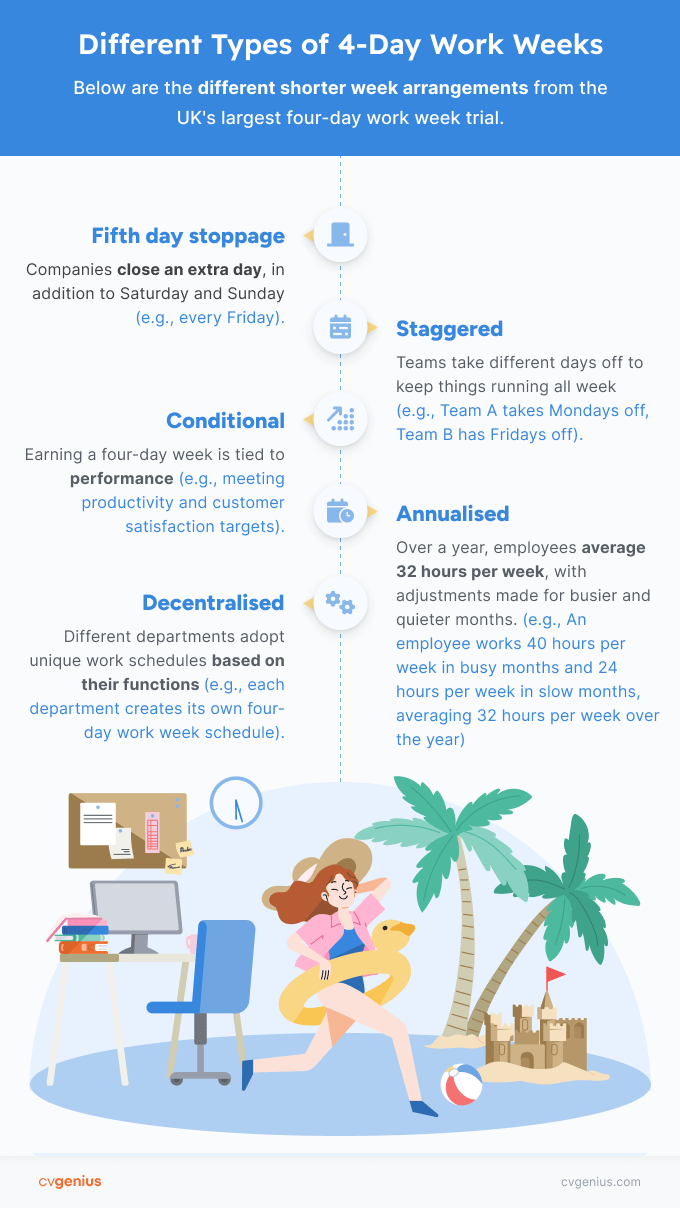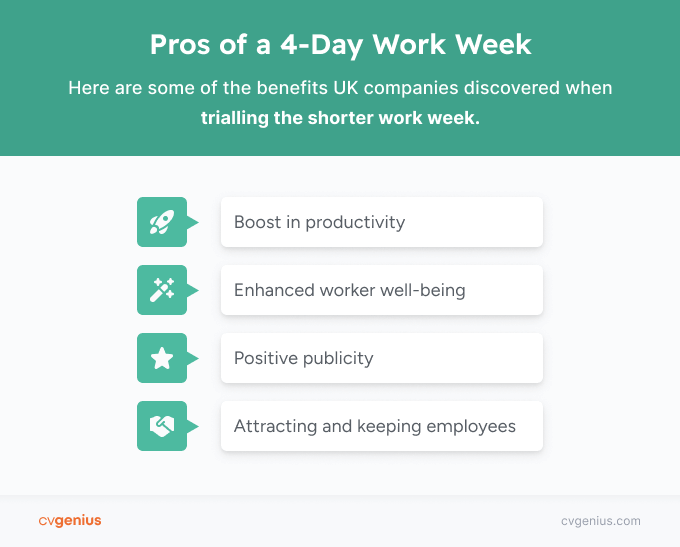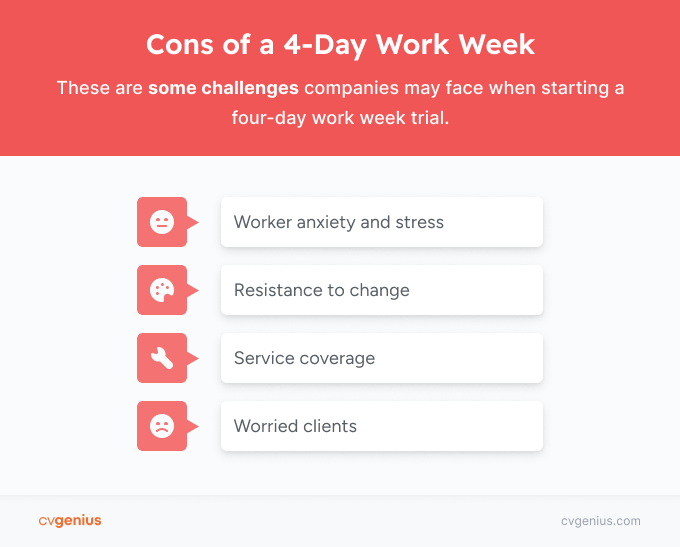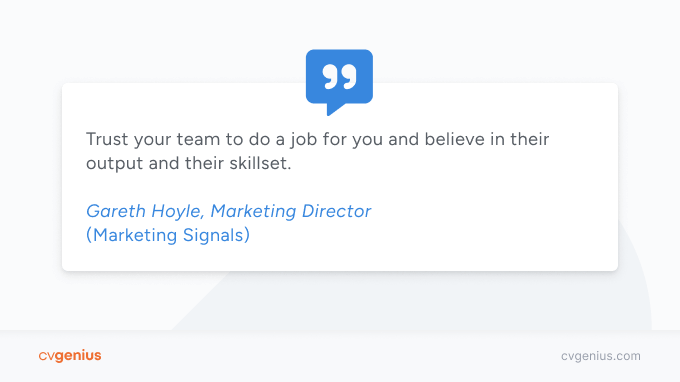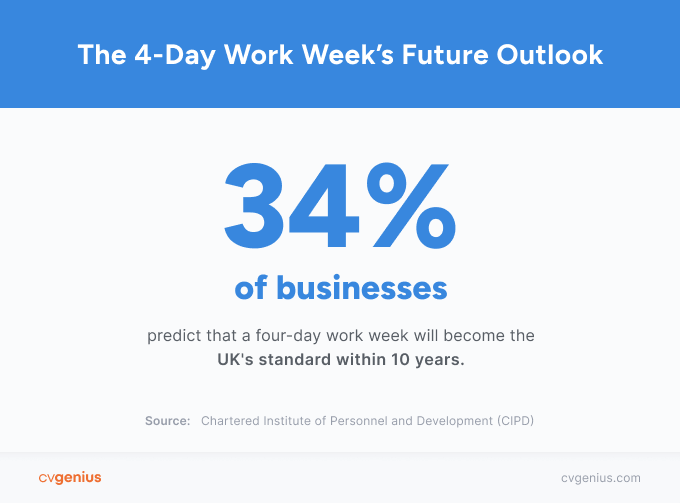A successful work-life balance is becoming a major priority for modern professionals, and the world is taking notice.
The four-day work week is a modern concept that’s being adopted by a rising number of UK companies. The focus? Work smarter, not longer.
But is a four-day work week the future of work?
According to Phil McParlane, Founder and CEO of 4dayweek.io, it might just be. ‘The four-day work week is on the brink of mass adoption in the UK’, he says. ‘It’s a win-win.’
Below, we share firsthand accounts and advice from UK professionals who have explored the four-day work week model and its impact on their employees’ work-life balance.
A work culture fit into four days
The four-day work week is exactly what it sounds like: a full-time working week done in four days instead of five.
Though the specifics of the system vary by case, companies reduce their employees’ working hours (not salaries) by rearranging office hours to meet their organisational needs.
From June to December 2022, the UK rolled out an experimental trial known as the Four-Day Week Pilot. This large-scale initiative involved 61 businesses and 2,900 workers and explored various four-day week models tailored to each company’s needs.
As the founder of a recruitment platform, McParlane noticed that after trialling the new work week, many participating companies began rewriting their employment contracts.
‘The culture that’s emerging is one that’s centred on deliverables and outcomes, not just attendance.’ — Phil McParlane
Instead of framing employee responsibilities in terms of the amount of time they should be working, these contracts are based on clear project-based goals and expectations.
The culture that’s emerging, McParlane says, is one that’s centred on deliverables and outcomes, not just attendance.
Building a better work-life balance
Gareth Hoyle, Marketing Director of Marketing Signals hoped that reducing his team’s weekly working hours would actually increase productivity.
His company’s four-day work week trial began after one of their developers faced childcare scheduling challenges and proposed condensing his work into four days.
Hoyle believes that two days off doesn’t allow employees to fully recover from five days of work and handle their personal commitments.
‘If I find it tiring, as the business owner who reaps the profits, I can only imagine how drained my salaried employees must feel,’ he says.
Instead of merely acknowledging the potential of the four-day work week, he introduced a staggered system.
Under this rotating work model, one team would take Fridays off, while the other would have Mondays off, ensuring a seamless workflow while still granting employees their four-day work week.
Benefits of a four-day week
Working a four-day week offers greater payoffs than just a longer weekend. Let’s consider what advantages a shorter work week has brought so far:
1. A boost in productivity
Several companies saw a correlation between improved productivity and employee morale during the four-day work week trial.
After being surveyed, trialling companies rated their overall experience at 8.3 out of 10, and both company performance and productivity received an average score of 7.5.
Given the positive feedback on overall experience, company performance, and productivity, the four-day work week appears to be a beneficial model for companies that are currently on it.
Claire Daniels, CEO of Trio Media, says, ‘Our main motivator when entering the four-day work week was productivity. I’d say this has stayed the same. However, we can output the same in less time. Employee morale has improved, as has our bottom line.’
‘We’ve always aimed for working smarter, not harder, and therefore, the four-day work week was a logical step for us,’ says Annika Albert, Head of People Operations at SaaS company Scoro.
Beyond automating workflows and optimising meetings, Scoro has implemented a range of methods by analysing seven work areas, with goals of enhancing time management, refining goal-setting, and establishing company-wide communication principles.
‘Employee morale has improved, as has our bottom line.’ — Claire Daniels
Marketing Signals has a longstanding practice of using time tracking tools, which helped the company transition smoothly to a four-day work week.
Hoyle says using the tools, alongside ‘regular and transparent communication,’ helps work processes remain efficient and ensures that his employees get the support they need.
‘We clarified with everyone that we’re not time tracking them to try and trip them up,’ Hoyle explains. ‘There’s no point doing something if the output isn’t there.’
2. Improved employee well-being
Beyond productivity, the four-day work week has demonstrated its potential to enhance employees’ overall well-being.
‘It’s great to have a job that you love, and it’s even more wonderful if this job allows you to enjoy life more in general.’ — Annika Albert
‘I can’t say that it’s unexpected, but the fact that people feel that they have more time for personal life is most rewarding,’ Albert says.
‘Team members pick up new (or old) hobbies, volunteer, use Fridays to learn new skills, spend more quality time with their families, and travel. It’s great to have a job that you love, and it’s even more wonderful if this job allows you to enjoy life more in general.’
In addition to personal time, Hoyle encourages his workers to explore new skills and offers to fund training courses that can benefit both their personal growth and the business.
He explains that just as one wouldn’t dine at the same restaurant every night, employees also want varied experiences throughout their careers.
3. Unexpected publicity and coverage
Embracing the four-day work model can significantly elevate a company’s public profile.
For several businesses, adopting the four-day work model has not only improved work dynamics for many businesses but also spotlighted them in the media.
Daniels says that implementing a shorter work week gave her organisation a PR boost. ‘The unexpected benefits for Trio Media were the amount of publicity and coverage we got from [the four-day work week], which helped to raise our profile.’
In a testament to its success, Daniels also launched a new venture, The4dayplanner, building on the momentum generated by the shorter work week.
Hoyle reflects on the transition to the four-day work week and the subsequent media attention. ‘Overall, it’s been successful. We’re definitely not going back, that’s for sure.’
4. Higher recruitment and retention rates
The promise of a four-day work is an attractive perk for many job applicants.
Albert says that since implementing the four-day work week, Scoro became ‘more visible’ to talent worldwide and helped the company advertise its shorter work week culture to job seekers.
Potential customers being curious about the four-day work week have also increased their interest in Scoro’s work management software.
‘My attraction and retention have never been higher.’ — Gareth Hoyle
Daniels says, ‘Our staff retention rates at Trio Media have remained remarkably high since embracing the four-day work week, establishing it as a significant draw for prospective talent.’
Hoyle shares a similar view. ‘A massive advantage to implementing the four-day work week in such a competitive labour market is that my attraction and retention have never been higher.’
Biggest flaws of the 4-day work week schedule
While the four-day work week has gained much attention and support, considering its potential drawbacks is also essential.
Below are some of the challenges associated with this model:
1. Potential burnout
Implementing a four-day workweek with longer daily hours can worsen workplace stress, extend burnout problems, and lead to scheduling conflicts with personal and social commitments.
And for many, that’d be unnecessarily added pressure. According to recent statistics on employee wellbeing, 82% of workers have experienced burnout in their current jobs, with 51% attributing it to ‘too much time at work.’
Albert’s company conducts regular employee surveys to get a more well-rounded view of the effectiveness of the four-day work week model.
These surveys focus on team happiness, the effectiveness of new working methods, and the impact of the four-day schedule on work-life balance and mental health.
Metrics like sick leave, candidate applications, and turnover rates are analysed separately at Scoro to ensure a comprehensive view of the model’s impact.
Hoyle acknowledges the challenge of condensing a week’s work into just four days.
He says that Marketing Signals conducts a thorough measurement and process-driven approach, which allows them to identify signs of fatigue or stress among team members.
‘We encourage them to take a few hours off, recharge by going to the gym, breaking a sweat, relaxing in a sauna, or simply going for a refreshing walk. We want to ensure our team stays energised and motivated.’
2. Resistance to change
A common challenge companies face when switching to a four-day work week is resistance to deviating from the norm.
Much like companies struggled when adjusting to remote work during the pandemic, some participants in the four-day work week trial experienced initial growing pains.
Hoyle observed some Marketing Signals employees struggling to fill their extra day off, often logging in and staying connected on work-related platforms.
He says that changing a well-established work routine, especially for those with years of experience, with traditional Monday to Friday schedules, can initially leave people uncertain about how to use their newfound free time.
To aid the transition at Scoro, Albert says her company introduced changes gradually over six months and included video sessions and comprehensive guidelines.
Scoro also appoints ‘four-day work week champion’ employees to support the team during the transition.
3. Service coverage
Operational challenges naturally arise when implementing a four-day work week model, such as managing customer support on Fridays and approaching public holidays.
Hoyle points out the unique requirements of different sectors. ‘With customer service, you’re probably going to have to think about expanding your workforce and then the cost of extra employees.’
‘We’re very lucky in digital that we can manage and measure our time. And because again, it tends to be projects rather than day-to-day assembly line type work. If you’re working, assembling cars, you can’t have eight cars that are 80% made, all queuing up waiting for you to return from your four days off.’
McParlane believes that experimenting with different work week models can help address these challenges.
‘Much like the transition to remote work during the pandemic, most of these challenges tend to resolve themselves naturally over time. For instance, the issue of Friday customer support can be addressed by dividing the team into two rotating shifts: Monday to Thursday and Tuesday to Friday,’ he says.
4. Worried clients
Managing client expectations can become a scheduling headache, especially for customer-facing companies.
Daniels reveals that initially, Trio Media didn’t inform its clients about the transition to the four-day work week. Instead, her company closely monitored whether their clients would notice any difference.
Over time, Trio Media set clear expectations about team availability on specific days and ensured clients always had a point of contact throughout the week.
As the leader of his marketing agency, Hoyle emphasises setting realistic expectations with clients, especially when sudden requests or emergencies arise. He mentions an instance when a client requested a project by the end of the week.
Although Hoyle has a strict policy on employees not doing overtime, he says that sometimes emergencies happen and will ensure that the team gets their time back on a future day.
‘As long as you’re open and honest with your clients and employees about time management and scheduling, then it’s not an issue.’ — Gareth Hoyle
He believes that while companies in some industries can adapt easily to the four-day work week, others (e.g., healthcare, customer service, and manufacturing) face distinct challenges.
The future of the four-day work week
As companies look to the future, the Chartered Institute of Personnel and Development (CIPD) reports that 34% of surveyed organisations foresee the four-day work week becoming standard practice for most UK workers within the next decade.
This work model is also gaining acceptance in European nations like Belgium, Portugal, and France, marking a growing shift in how we approach work-life balance.
Reflecting on her company’s adoption of the shorter work week, Albert says having a clear ‘why’ is important and involving the team during the transition are critical to success.
‘Don’t give up. Be ready to change your approach based on regular feedback ‘until you find the best solution.’ — Annika Albert
Daniels shares the belief that managers have to commit to the transition to see positive results. ‘If you’re considering a four-day work week, you’re halfway there. Consult other businesses that have made the shift but also remember that your approach should be unique to your organisation’s needs.’
Looking at historical shifts in work schedules, such as Henry Ford’s transition from a six-day to a five-day work week, Hoyle envisions a future where employees work fewer days and enjoy the flexibility of working 8 hours anytime and anywhere.
He remains optimistic that advancements in technology and a more skilled workforce will continue to improve how people work and live and help them achieve a more balanced lifestyle.
Join the four-day work week conversation
Have you trialled the four-day work week or have insights to share?
Your experiences and comments about the four-day work week as an employee or an employer can shape the understanding of the UK’s evolving work culture by informing other businesses who are considering making the shift.
If you’d like to discuss your story and be a part of a future update on our blog, we invite you to reach out to us at seb@cvgenius.com or eduardo@cvgenius.com.
Sources
- 4 Day Week UK, ‘Pilot Programme’
- ACCA Global, ‘Four-day Work Week Could be the Norm by 2030’
- Autonomy, ‘The Results are in: The UK’s Four-day Week Pilot’
- CIPD, ‘A Third of Businesses Expect the Four-day Week to Become a Reality in the Next Ten Years, New Research Shows’
- Connexion France, ‘How France Learned to Embrace the Four-day Week’
- Euronews, ‘Four-day Week, Portugal’s the Latest European Country to Trial a Shorter Work Week’
- Euronews, ‘Four-day Week, Which Countries Have Embraced it and How’s it Going so Far?’
- Post Parliament UK, ‘The Impact of Remote and Hybrid Working on Workers and Organisations’
- Reuters, Focus, ‘Making the Four-day Week Work for Britain’
- This Day in History, ‘Ford Factory Workers Get 40-Hour Week’
- Weforum, ‘4-Day Work Week Trial’
About CV Genius
CV Genius is the go-to resource for UK job seekers of all industries and experience levels.
With an intuitive CV maker, a diverse collection of free industry-specific resources like cover letter examples and CV templates, as well as guides on how to write a perfect CV and cover letter. CV Genius has been featured in multiple renowned publications, such as the BBC, HR.com, MSN, Forbes, and Glassdoor.
CV Genius and its team of career advisors and HR specialists can help anyone make an effective job application and earn more interviews.
For media queries or concerns, please contact us.

